新版pep六年级下册unit2知识点
(完整版)人教版六年级英语下册Unit2知识点汇总
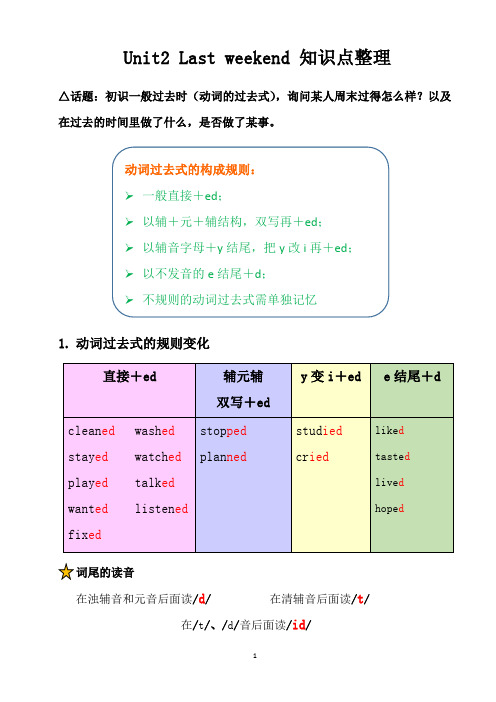
Unit2 Last weekend 知识点整理△话题:初识一般过去时(动词的过去式),询问某人周末过得怎么样?以及在过去的时间里做了什么,是否做了某事。
1.动词过去式的规则变化词尾的读音在浊辅音和元音后面读/d/ 在清辅音后面读/t/在/t/、/d/音后面读/id/2.不规则动词过去式do/does did am/is was are were have/has had see saw drink drank go went sleep slept make made get got read read3.动词短语cleaned my room washed my clothes stayed at home watched TV did my homework drank tea(喝茶) read a book saw a film(看电影) had a cold(感冒) went boating(划船) listened to music made the bed(整理床铺) 4.时间短语last night(昨晚)last Monday(上周一) last weekend(上个周末) yesterday(昨天) the day before yesterday(前天)△句型:①询问对方周末过得怎么样How was your weekend?—— It was fine/good/great,thank you.②询问某人在过去的时间里做了什么What did+主语+do(+过去时间)?——主语+动词过去式+其他。
例句:What did you do last weekend?—— I stay ed at home and watch ed TV.③询问对方在过去的时间里是否做了某事Did +主语+动词原形+其他?—— Yes,主语 did. / No, 主语 didn’t.例句:Did he have a cold yesterday?—— Yes,he did. / No,he didn’t.Did you see a film (last night)?—— Yes,I did. / No,I didn’t.④询问电影是否有趣Was it interesting?—— Yes,it was. / No, it wasn’t.△知识点:1:否定(缩写)形式:直接+not did didn’twas wasn’t were weren’t2:想要做某事:want + to +动词原形3:than+动词ing 例:It’s faster than walking.4:enjoy(享受)+动词ing I enjoy playing computer games. 5: too 用于肯定句either 用于否定句6: 句型的转换①He read a book yesterday afternoon.(对划线部分提问)What did he do yesterday afternoon ?②I washed my clothes last morning.(改为一般疑问句)Did you wash your clothes last morning?也③I went shopping last night. (改为否定句)I didn’t go shopping last weekend.④Did you do your homework last night. (否定回答)No,I didn’t.⑤My weekend was bad . (就划线部分提问)How was your weekend ?易错题❖ She usually clean s her room on the weekend.❖ She clean ed her room last weekend.❖ I like watch ing TV. I watch ed TV yesterday.❖ I am going to see a film next Friday. I saw a film last Friday. ❖ We didn’t go boating the day before yesterday.。
PEP六年级(下册)英语Unit,2单元知识梳理(2)
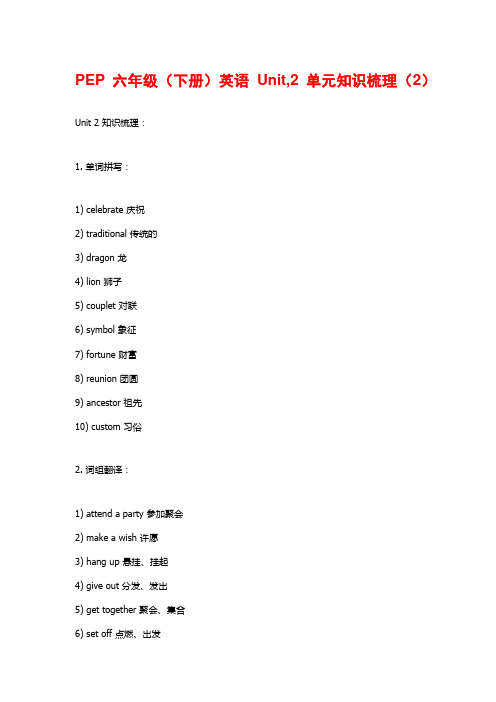
PEP六年级(下册)英语Unit,2单元知识梳理(2)Unit 2 知识梳理:1. 单词拼写:1) celebrate 庆祝2) traditional 传统的3) dragon 龙4) lion 狮子5) couplet 对联6) symbol 象征7) fortune 财富8) reunion 团圆9) ancestor 祖先10) custom 习俗2. 词组翻译:1) attend a party 参加聚会2) make a wish 许愿3) hang up 悬挂、挂起4) give out 分发、发出5) get together 聚会、集合6) set off 点燃、出发7) watch fireworks 观看烟花8) light candles 点燃蜡烛9) send out 发送、寄出10) receive red packets 领取红包3. 句子翻译:1) The Chinese New Year is the biggest traditional festival in China.中国的春节是中国最重要的传统节日。
2) People celebrate the Chinese New Year with various customs and traditions. 人们用各种各样的习俗和传统来庆祝春节。
3) During the Chinese New Year, people light candles to scare away evil spirits. 在中国的春节期间,人们点燃蜡烛来驱邪。
4) My family always gets together for a big reunion on Chinese New Year's Eve. 我家每年春节前夜都会举行一次大聚会。
5) According to Chinese tradition, we should clean our homes to sweep away bad luck before the New Year starts.根据中国的传统,我们应该在新年开始之前打扫家里以扫除厄运。
六年级英语下册第二单元知识点

六年级英语下册第二单元知识点Unit 2 of Grade 6 English Textbook: Knowledge Points。
In Unit 2 of the Grade 6 English textbook, students will learn various knowledge points related to different aspects of the English language. This unit aims to enhance students' understanding and application of English grammar, vocabulary, and reading skills. Let's explore the key points covered in this unit.Firstly, the unit focuses on grammar, specifically the usage of the simple past tense. Students will learn how to form and use the simple past tense correctly in sentences. They will understand that regular verbs add "-ed" to the base form to form the past tense, while irregular verbs have different forms altogether. Through exercises and examples, students will practice using the simple past tense and gain confidence in their ability to communicate effectively in the past.Secondly, vocabulary development is an essential aspect of this unit. Students will be introduced to new words and phrases related to various topics, such as hobbies, sports, and daily routines. They will learn how to pronounce these words correctly and understand their meanings. Through engaging activities and exercises, students will expand their vocabulary and be able to use these words in context.In addition to grammar and vocabulary, reading comprehension skills are also emphasized in this unit. Students will read different texts, such as stories, dialogues, and descriptions, and answer comprehension questions. They will learn how to identify main ideas, make inferences, and draw conclusions from the given texts. By practicing these skills, students will improve their reading ability and develop a deeper understanding of the English language.Furthermore, the unit introduces students to the concept of adverbs of frequency. Students will learn how to use adverbs such as "always," "often," "sometimes," "rarely," and "never" to express the frequency of actions or events. They will understand that adverbs of frequency are placed before the main verb in a sentence. Through exercisesand examples, students will practice using adverbs of frequency and gain a better understanding of their usage.Moreover, the unit covers the topic of comparative and superlative forms of adjectives. Students will learn how to compare different objects or people using words such as "bigger," "smaller," "more beautiful," and "most interesting." They will understand that comparatives are used to compare two things, while superlatives are used to compare more than two things. Through practice exercises, students will enhance their ability to describe and compare objects and people accurately.Lastly, the unit includes listening activities that aim to improve students' listening comprehension skills. Students will listen to various audio clips and answer questions based on what they hear. By actively listening and focusing on details, students will develop their listening ability and enhance their overall language proficiency.In conclusion, Unit 2 of the Grade 6 English textbook covers a range of knowledge points related to grammar, vocabulary, reading comprehension, adverbs of frequency, and comparative and superlative forms of adjectives. Through engaging activities and exercises, students will deepen their understanding of these concepts and improve their language skills. This unit provides a solid foundation for students to continue their English language learning journey.。
pep六年级英语下册知识点总结
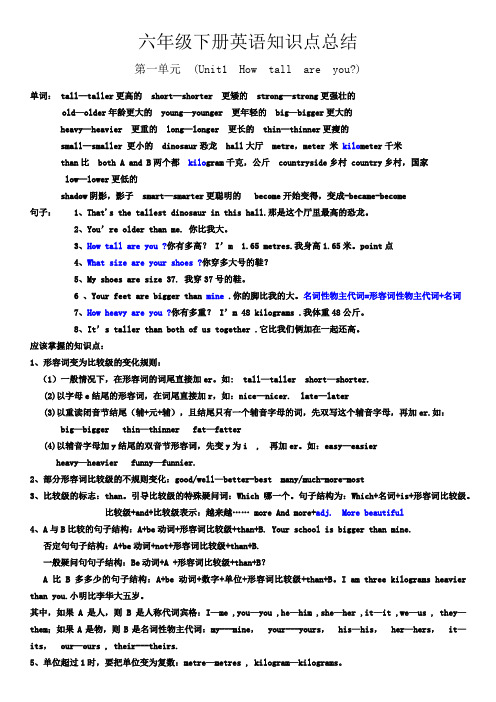
六年级下册英语知识点总结第一单元(Unit1 How tall are you?)单词: tall—taller更高的short—shorter 更矮的strong—strong更强壮的old—older年龄更大的young—younger 更年轻的big—bigger更大的heavy—heavier 更重的long—longer 更长的thin—thinner更瘦的small—smaller 更小的 dinosaur恐龙 hall大厅 metre,meter 米kilo meter千米than比 both A and B两个都 kilo gram千克,公斤 countryside乡村 country乡村,国家low—lower更低的shadow阴影,影子 smart—smarter更聪明的 become开始变得,变成-became-become句子: 1、That's the tallest dinosaur in this hall.那是这个厅里最高的恐龙。
2、You’re older than me. 你比我大。
3、How tall are you ?你有多高? I’m 1.65 metres.我身高1.65米。
point点4、What size are your shoes ?你穿多大号的鞋?5、My shoes are size 37. 我穿37号的鞋。
6 、Your feet are bigger than mine .你的脚比我的大。
名词性物主代词=形容词性物主代词+名词7、How heavy are you ?你有多重? I’m 48 kilograms .我体重48公斤。
8、It’s taller than both of us together .它比我们俩加在一起还高。
应该掌握的知识点:1、形容词变为比较级的变化规则:(1)一般情况下,在形容词的词尾直接加er。
如: tall—taller short—shorter.(2)以字母e结尾的形容词,在词尾直接加r,如:nice—nicer. late—later(3)以重读闭音节结尾(辅+元+辅),且结尾只有一个辅音字母的词,先双写这个辅音字母,再加er.如:big—bigger thin—thinner fat—fatter(4)以辅音字母加y结尾的双音节形容词,先变y为i , 再加er。
人教PEP版英语六年级下册Unit 1-4知识点总结(期末复习)
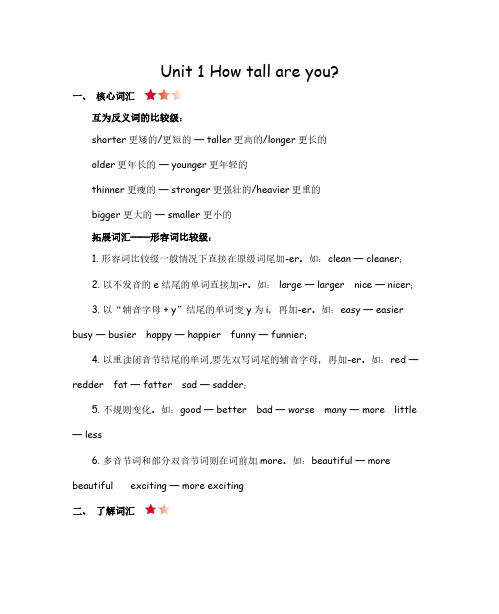
Unit1How tall are you?一、核心词汇互为反义词的比较级:shorter更矮的/更短的—taller更高的/longer更长的older更年长的—younger更年轻的thinner更瘦的—stronger更强壮的/heavier更重的bigger更大的—smaller更小的拓展词汇——形容词比较级:1.形容词比较级一般情况下直接在原级词尾加-er。
如:clean—cleaner;2.以不发音的e结尾的单词直接加-r。
如:large—larger nice—nicer;3.以“辅音字母+y”结尾的单词变y为i,再加-er。
如:easy—easier busy—busier happy—happier funny—funnier;4.以重读闭音节结尾的单词,要先双写词尾的辅音字母,再加-er。
如:red—redder fat—fatter sad—sadder;5.不规则变化。
如:good—better bad—worse many—more little —less6.多音节词和部分双音节词则在词前加more。
如:beautiful—more beautiful exciting—more exciting二、了解词汇dinosaur恐龙hall大厅metre米(美式英语:meter)than比both两个都kilogram千克;公斤countryside乡村lower(low的比较级)更低地shadow阴影;影子smarter(smart的比较级)更聪明的become开始变得;变成三、核心句型1.—How tall are you?你有多高?—I’m1.64metres.我身高1.64米。
2.—What size are your shoes,Mike?迈克,你穿多大号的鞋?—Size7.7号。
3.—How heavy are you?你体重多少?—I’m48kilograms.我体重48公斤。
(完整版)新版pep六年级下册unit2知识点
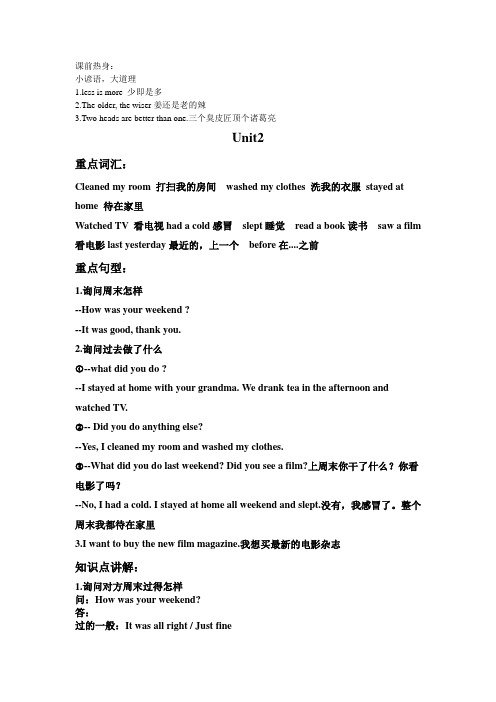
课前热身:小谚语,大道理1.less is more 少即是多2.The older, the wiser姜还是老的辣3.Two heads are better than one.三个臭皮匠顶个诸葛亮Unit2重点词汇:Cleaned my room 打扫我的房间washed my clothes 洗我的衣服stayed at home 待在家里Watched TV 看电视had a cold感冒slept睡觉read a book读书saw a film 看电影last yesterday最近的,上一个before在....之前重点句型:1.询问周末怎样--How was your weekend ?--It was good, thank you.2.询问过去做了什么①--what did you do ?--I stayed at home with your grandma. We drank tea in the afternoon and watched TV.②-- Did you do anything else?--Yes, I cleaned my room and washed my clothes.③--What did you do last weekend? Did you see a film?上周末你干了什么?你看电影了吗?--No, I had a cold. I stayed at home all weekend and slept.没有,我感冒了。
整个周末我都待在家里3.I want to buy the new film magazine.我想买最新的电影杂志知识点讲解:1.询问对方周末过得怎样问:How was your weekend?答:过的一般:It was all right / Just fine过得很好:It was good/ great Pretty good.过得不好:It was awful! Pretty bad 糟糕透了2.学习一般过去时(1)用法:一般过去时表示过去的某个时间发生的动作或存在的状态。
PEP英语六年级下册Unit2语法归纳
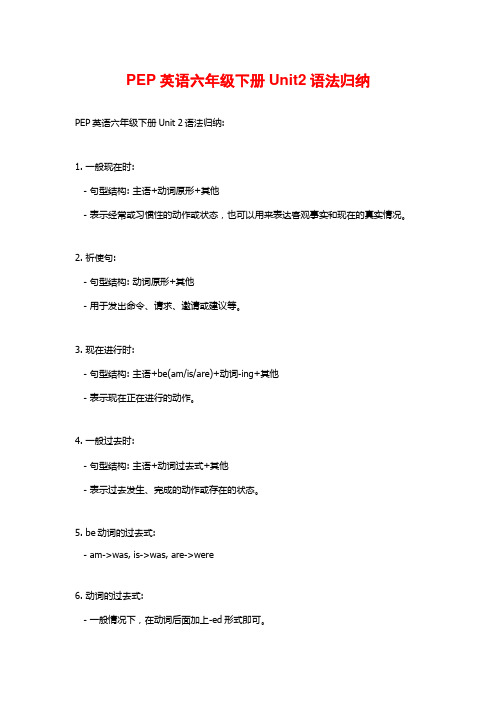
PEP英语六年级下册Unit2语法归纳
PEP英语六年级下册Unit 2语法归纳:
1. 一般现在时:
- 句型结构: 主语+动词原形+其他
- 表示经常或习惯性的动作或状态,也可以用来表达客观事实和现在的真实情况。
2. 祈使句:
- 句型结构: 动词原形+其他
- 用于发出命令、请求、邀请或建议等。
3. 现在进行时:
- 句型结构: 主语+be(am/is/are)+动词-ing+其他
- 表示现在正在进行的动作。
4. 一般过去时:
- 句型结构: 主语+动词过去式+其他
- 表示过去发生、完成的动作或存在的状态。
5. be动词的过去式:
- am->was, is->was, are->were
6. 动词的过去式:
- 一般情况下,在动词后面加上-ed形式即可。
7. 带有情态动词的英语句子:
- 情态动词可以用来表示说话人对某种动作或状态的评价、推测、建议等。
8. 比较级和最高级:
- 比较级用于比较两者之间的程度或数量,最高级则表示三者或三者以上的程度或数量的最高。
9. 数词:
- 用来表示具体的数量。
10. 及物动词和不及物动词:
- 及物动词后面必须加上宾语来完成意思,而不及物动词在意思上已经完整。
这些是PEP英语六年级下册Unit 2的一些语法要点,希望对你有帮助!。
PEP人教版六年级下册英语重点知识总结 unit2

Unit 2 What’s the matter, Mike?一、单词与短语1.have a fever 发烧2.have a sore throat喉咙疼3.have a cold感冒4.have a toothache 牙疼5. have a headache 头疼6.matter事情,麻烦7.sore 疼的8.hurt疼痛9.nose 鼻子10.tired疲劳的,累的11.excited兴奋的12.angry生气的13.happy高兴的14.bored无聊的,烦人的15.sad 忧伤的,悲伤的16.sick 不舒服17. take some medicine 吃点药18.have the flu患流感二、句型1. What’s the matter? 你怎么啦?2. How do you feel? 你感觉如何?How dose Amy feel? Amy感觉如何?3. My leg hurts. 我腿疼。
I have a toothache. 我牙疼。
4. Do you have a sore throat? 你喉咙疼吗?5. Don’t worry! 别担心!6. You will feel better soon! 你很快会好起来的!7. You look happy. 你看起来很开心。
8. I feel very sad. 我感觉很伤心。
三、对话Doctor: How do you feel? 你感觉如何?Amy: I feel sick. 我不舒服。
Doctor: What’s the matter? 你怎么啦?Amy: I have a fever. 我发烧了。
Doctor: let me see. 让我看看。
Do you have a sore throat? 你喉咙疼吗?Amy: Yes. My throat is sore. 是的。
我的喉咙很疼。
Doctor: Don’t worry! Take some medicine. You will feel better soon! 别担心,吃点药就好了!Amy: Thank you very much!非常感谢!Doctor: You are welcome! 不客气!练习题一、翻译下列短语(10分)感冒发高烧头痛have a sore throat牙痛二、选词填空(20分)1 、What’s the (matter, wrong) with you?2、I (have, feel ) a fever.3、My throat is (sore, ill).4、What’s wrong (for, with) you?5、You’d better go to (see, look) a doctor.三、选答句(20分)1. Does Lisa feel angry? ( )2. Do Chen Jie go swimming with her parents? ( ) 3. What is the matter with you, John? ( )4. How do you go to Beijing? ( )5. What do you do when you hurt your leg? ( )四、补全对话。
2023年人教PEP版英语六年级下册知识衔接Unit2Lastweekend

选择题(题文)Did you ____ your clothes on the weekend?A. washB. washedC. washes【答案】A【解析】考查固定搭配。
句意:你在周末洗衣服了吗?助动词Did 后接动词原形,故选A。
看图题sleep ()A. B.【答案】A【解析】词意:睡觉,故选A。
考查学生对单词的掌握。
选择题— did you go on your holiday? ()—Shanghai.A. WhatB. WhereC. How【答案】B【解析】句意:你假期去了……?-上海。
根据回答中的Shanghai可知此处是对假期中去的地点提问,因此用where,故选B。
考查疑问代词的应用。
选择题—Did you go shopping last night? ()—A. Yes,I am.B. No,I don't.C. No,I didn't.【答案】C【解析】句意:-你昨晚去购物了吗?-……用did提问应该用did回答,故选C。
考查一般疑问句的回答。
选择题(题文)Mr Alex talked ____ a lot of new films.A. withB. aboutC. to【答案】B【解析】考查介词。
句意:Alex 先生谈论了许多新电影。
talk about 谈论,故选B。
选择题(题文)—Did you do ____ at home?—No.A. everything elseB. anything elseC. else anything【答案】B【解析】考查不定代词和固定搭配。
句意:——你在家还做了其他什么事吗?——没有。
此句为一般疑问句,因此应该用anything,anything else 别的事情,故选B。
选择题—What did you do yesterday?—I ____ ____ home and did my homework.A. stayed; atB. stayed; inC. stay; at【答案】A【解析】考查一般过去时和动词短语。
寒假预习Unit2Lastweekend语法预习(讲义)-人教PEP版英语六年级下册

寒假预习六年级下册Unit 2 Last weekend(语法)一、知识点讲解:1.How was your weekend?It was good, thank you.Well, I stayed at home with your grandma. We drank tea in the afternoon and watched TV.Did you do anything else?1. Lily ___________ (study) Chinese the day before yesterday.2. Fang Yuan ___________ (play) the piano yesterday.3. The baby ___________ (cry) last night.4. He ___________ (stop) to wait for the green light just now.5. My uncle ___________ (live) in a village last year.6. He didn’t ___________ (sleep) all night.7. — What did you do this morning?— I ___________ (meet) my friend Joy. She ___________ (e) to see me this morning.练习2:按要求改写句子。
1.I saw a film last night. (就画线部分提问)____________________________________________________________2.He had a cold yesterday. (改为一般疑问句)____________________________________________________________3.Did you read a book last night? (作否定回答)____________________________________________________________4.I read a book last weekend. (对画线部分提问)___________________________________________________________5.It talked about a lot of new films. (改为一般疑问句)___________________________________________________________6.Was it interesting? (作肯定回答) _______________________________7.I clean my room every day. (用yesterday 改写句子)____________________________________________________________练习3:选择正确的答案。
新PEP六年级英语下册 Unit 2Last weekend
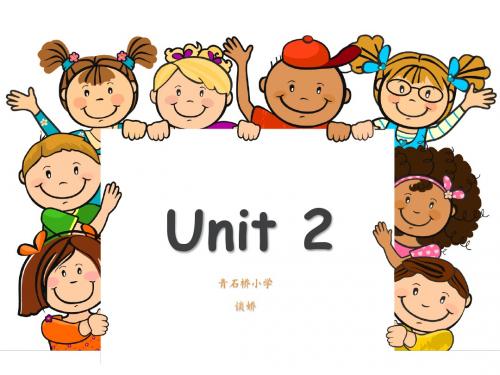
yesterday
the day before yesterday ... B:I saw see a film. A: Did Do you like it ?
B:Yes,I did do .It was is great.
Follow “Let's learn”. P17
Finish”Let's try”P16
What did you do ?
Grammar tips:在过去发生的事情,动词要用过去时态。
i.e: is ---was
do---did
clean my room---cleaned my room
wash clothes---washed clothes
stay at home---stayed at home watch TV---watched TV
What did you do last weekend?
I stayed at home and saw a film.
What do you usually do on weekends?
I stay at home and see a film.
表示现在习惯或经常反复发生的动作用一般现在时。
Finish “Read and write”
Finish “Let's check”
Finish” Let's wrap it up”
不规则动词的过去式。 is / am ---was go---went do---did see---saw read---read have---had
sleep--splet
enjoy “Let's sing”
六年级下册英语:Unit 2 Last weekend 一般过去时定义人教PEP版

一般过去时一.一般过去时口诀:1.一般过去时并不难,表示过去动作、状态记心间。
2.动词要用过去式,时间状语句末站。
3.否定句很简单,didn't 站在动词原形前,其它部分不要变。
4.一般疑问句也好变,did放在句子前,主语、动原、其它部分依次站。
5. 特殊疑问句也简单,疑问词加一般疑问句记心间。
6. 最后一条请注意,动词过去二.一般过去时的结构(可分三类不同的结构)概念:一般过去时用来表示过去某一时间内发生的动作或存在的状态以及过去习惯性、反复性的动作。
谓语动词要用动词的过去式,常和表示过去的时间状语连用,如yesterday昨天、last night昨晚、last week上周、last year去年等。
Be动词的一般过去时在没有实义动词的句子中使用be动词,am is 的过去式为was; are的过去式为were肯定句式:主语+ be(was , were) + 其它.否定句式:主语+ be(was , were) + not + 其它.一般疑问句:Be(was , were) + 主语+ 其它?注:在这种构成中,be动词有人称和数的变化,即要根据主语选用was / were。
Be动词分为单数和复数,was是表示单数,were是表示复数。
2实义动词的一般过去时态肯定句要使用动词的过去式,否定句和疑问句要使用助动词do和does 的过去式did.肯定句式:主语+ 动词(过去式)+ 其它否定句式:主语+ didn’t + 动词(原形)+ 其它【did n ot = didn’t】一般疑问句:Did + 主语+ 动词(原形)+ 其它【do , does的过去时均为did】?注 1. did和didn’t 是构成一般过去时的助动词,其特点是要在其后跟动词的原形。
2. 实意动词do的一般过去时I do my homework every day.(用yesterday改写句子)I did my homework yesterday.I didn’t do my homework yesterday.(否定句)Did you do your homework yesterday?Yes ,I did. /No, I didn’t.(一般疑问句)3情态动词的一般过去时态情态动词的过去式:can→could , may→might , must→must ,will-would,should-should。
人教PEP版-英语-六年级下册--6B Unit2知识讲解素材 你怎么了?
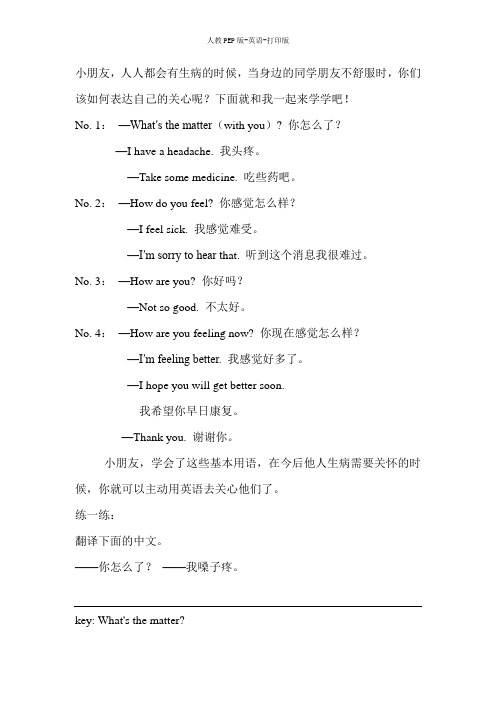
小朋友,人人都会有生病的时候,当身边的同学朋友不舒服时,你们该如何表达自己的关心呢?下面就和我一起来学学吧!
No. 1:—What′s the matter(with you)? 你怎么了?
—I have a headache. 我头疼。
—Take some medicine. 吃些药吧。
No. 2:—How do you feel? 你感觉怎么样?
—I feel sick. 我感觉难受。
—I′m sorry to hear t hat. 听到这个消息我很难过。
No. 3:—How are you? 你好吗?
—Not so good. 不太好。
No. 4:—How are you feeling now? 你现在感觉怎么样?
—I′m feeling better. 我感觉好多了。
—I hope you will get better soon.
我希望你早日康复。
—Thank you. 谢谢你。
小朋友,学会了这些基本用语,在今后他人生病需要关怀的时候,你就可以主动用英语去关心他们了。
练一练:
翻译下面的中文。
——你怎么了?——我嗓子疼。
key: What's the matter?
My throat is sore。
PEP六年级下册复习Unit2 last weekend

went ________ hiking 5.Amy ________ (去郊游)with John yesterday.
A: What did you do last weekend/ yesterday? B: I played football .
A: Did you read books? B: Yes. I did /No. I didn’t
选择适当的句子,完成对话(只填序号)。 A: 3 What . did you do last weekend? 1 How about you? B: I played football. __________ A: I visited my grandparents. What did you do yesterday? 5 I went fishing. C: __________ A: Did you read books?1. How about you? C: 4 Yes, .I did. 2. Did you clean your room? A: 2 Did you clean your room? 3. What did you do last weekend? B: No , I didn’t. 4.Yes, I did. 5.I went fishing.
Saturday
Sunday
happy
My last weekend
Hi! I am Mike .I was busy last weekend. I__________________________________ _.I was happy.
请 注 意 红 色 字 体 部 分 哟 !
Do you know these words?
新版PEP小学英语六年级下1--4单元复习资料
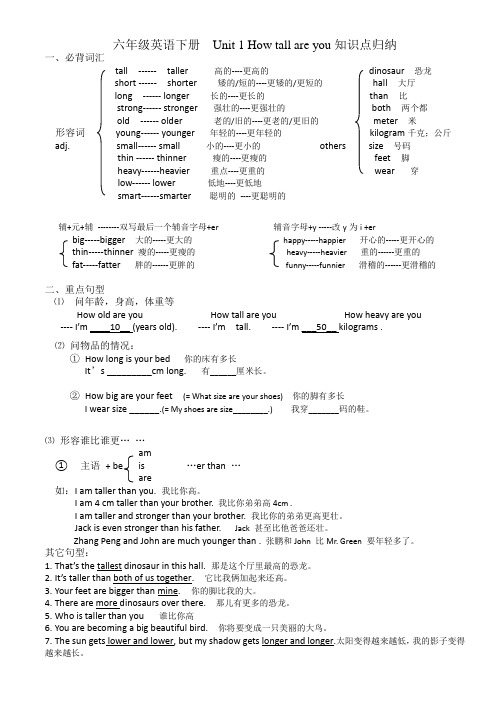
六年级英语下册Unit 1 How tall are you知识点归纳一、必背词汇tall ------ taller 高的----更高的dinosaur 恐龙short ------ shorter 矮的/短的----更矮的/更短的hall 大厅long ------ longer 长的----更长的than 比strong------ stronger 强壮的----更强壮的both 两个都old ------ older 老的/旧的----更老的/更旧的meter 米形容词young------ younger 年轻的----更年轻的kilogram千克;公斤adj. small------ small 小的----更小的others size 号码thin ------ thinner 瘦的----更瘦的feet 脚heavy------heavier 重点----更重的wear 穿low------lower低地----更低地smart------smarter聪明的----更聪明的辅+元+辅--------双写最后一个辅音字母+er 辅音字母+y -----改y为i +erbig-----bigger 大的-----更大的happy-----happier 开心的-----更开心的thin-----thinner瘦的-----更瘦的heavy-----heavier 重的------更重的fat-----fatter 胖的------更胖的funny-----funnier 滑稽的------更滑稽的二、重点句型⑴问年龄,身高,体重等How old are you How tall are you How heavy are you ---- I’m ____10__ (years old). ---- I’m tall. ---- I’m ___50__ kilograms .⑵问物品的情况:①How long is your bed你的床有多长It’s _________cm long. 有______厘米长。
人教版pep六年级英语下册unit 2 part A 全
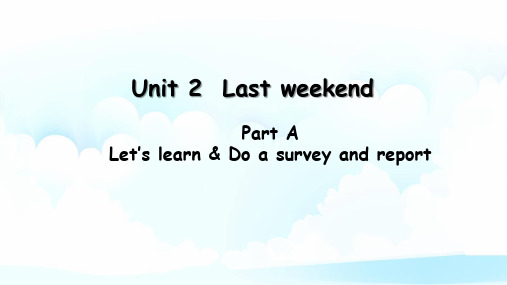
Exercise Report your findings!
summary
一般过去时
定义:一般过去时表示过去某个时间发生的动作 或者存在的状态,常和过去时间状语连用。
do ---- did am ---- was clean ---- cleaned wash ---- washed stay ---- stayed watch ---- watched
Play roles
Talk about what you did last weekend with your partner.
动词过去式构成法二:
将i变a
drink sing
drank sang
begin
began
sit
sat
give
gave
swim
swam
homework
Ask your classmates what they did last weekend and write down. Next class we will talk about that.
A. His grandparents.
B. His parents.
Let’s talk
Mike: Hi,Grandpa.How are you? How was your weekend?
Grandpa: I’m fine,mike.It was good, thank you.
Mike: What did you do? Grandpa: Well, I stayed at home with
(完整版)新版pep六年级下册unit2知识点
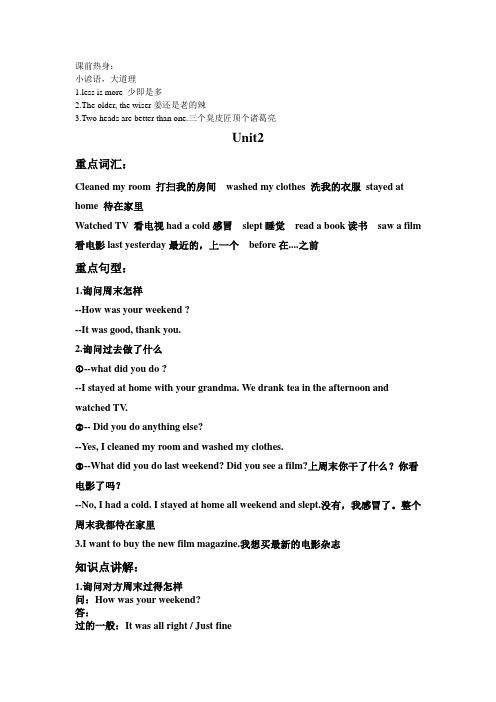
课前热身:小谚语,大道理1.less is more 少即是多2.The older, the wiser姜还是老的辣3.Two heads are better than one.三个臭皮匠顶个诸葛亮Unit2重点词汇:Cleaned my room 打扫我的房间washed my clothes 洗我的衣服stayed at home 待在家里Watched TV 看电视had a cold感冒slept睡觉read a book读书saw a film 看电影last yesterday最近的,上一个before在....之前重点句型:1.询问周末怎样--How was your weekend ?--It was good, thank you.2.询问过去做了什么①--what did you do ?--I stayed at home with your grandma. We drank tea in the afternoon and watched TV.②-- Did you do anything else?--Yes, I cleaned my room and washed my clothes.③--What did you do last weekend? Did you see a film?上周末你干了什么?你看电影了吗?--No, I had a cold. I stayed at home all weekend and slept.没有,我感冒了。
整个周末我都待在家里3.I want to buy the new film magazine.我想买最新的电影杂志知识点讲解:1.询问对方周末过得怎样问:How was your weekend?答:过的一般:It was all right / Just fine过得很好:It was good/ great Pretty good.过得不好:It was awful! Pretty bad 糟糕透了2.学习一般过去时(1)用法:一般过去时表示过去的某个时间发生的动作或存在的状态。
六年级下册英语2单元总结

六年级下册英语2单元总结介绍本文档是对六年级下册英语2单元的学习内容进行总结和回顾。
英语作为一门外语,学习起来可能会有一定的困难,但通过努力学习,我们可以提高自己的听说读写能力。
本文档将重点总结2单元所学的重要知识点,并提供一些学习方法和技巧。
重点知识点总结1. 时态在2单元中,我们学习了一些常用的时态,包括现在进行时、一般现在时以及一般过去时。
这些时态在日常英语中经常会用到,因此掌握它们对于正确使用英语语法和交流非常重要。
1.1 现在进行时现在进行时用于表示现在正在发生的动作或正在进行的状态。
它通常由“be +动词的ing形式”构成。
例如:I am studying English.(我正在学习英语。
)1.2 一般现在时一般现在时用于表示经常性的或普遍的动作或状态。
它通常由动词的原形构成,第三人称单数加-s或-es。
例如:He likes playing football.(他喜欢踢足球。
)1.3 一般过去时一般过去时用于表示过去发生的动作或状态。
它通常由动词的过去式构成。
例如:I ate an apple yesterday.(我昨天吃了一个苹果。
)2. 能力提升在2单元的学习中,我们也进行了一些能力提升的训练,以提高我们的听说读写能力。
以下是几个提升能力的方法和技巧:2.1 多听多说多听多说是提高英语口语能力的有效方法。
可以通过听英语歌曲、跟着英语录音或者参加英语口语交流活动来提升口语表达能力。
2.2 多读多写多读多写是提高英语阅读和写作能力的重要途径。
可以选择适合自己水平的英语读物进行阅读,并积累写作素材,多写作文、日记等来提高自己的写作能力。
2.3 制定学习计划制定一个合理的学习计划可以帮助我们更好地安排学习时间,合理分配各项学习任务,提高学习效率。
3. 学习体会在2单元的学习中,我收获了很多。
通过不断的练习和努力,我对英语的各种时态和语法规则有了更深入的了解。
同时,通过不断的听、说、读、写训练,我的英语口语和写作能力也有了一定的提高。
人教PEP版六年级英语下册Unit-2知识清单梳理

人教PEP版六年级英语下册Unit 2知识清单梳理Unit 2 Last weekend一、核心词汇1.动词短语类:cleaned my room 打扫房间washed my clothes洗衣服stayed at home待在家里watched TV看电视read a book读书saw a film看电影had a cold感冒2.时间短语类:last weekend上周末yesterday昨天last night昨天晚上last Monday上个星期一the day before yesterday前天二、了解词汇drank喝show演出better更好的faster更快的fixed 修理broken破损的anything else其他的事情三、核心句型1. How was your weekend?你周末过得怎么样?2. —What did you do last weekend?上周末你干什么了?—I played football.我踢足球了。
解读: What did + 主语+ do + 过去时间?用来询问他人过去某一时间做了什么事情。
回答用“主语+ 动词过去式+ 其他.”。
举一反三: —What did Zoom do yesterday morning?昨天早上祖姆干什么了?—He went swimming. 他去游泳了。
—What did his parents do yesterday evening?昨天晚上他父母干什么了?—They watched TV at home. 他们在家看电视了。
—What did your mother do last weekend?上周末你妈妈干什么了?—She cleaned the house. 她打扫房间了。
3. —Did you read books?你读书了吗?—Yes, I did./No, I didn’t.是的,我读了。
人教PEP六年级英语下unit2知识点精讲

Unit 2 My Weekend
模块一:单词拼读
cleaned 打扫(clean的过去式) stayed 停留;呆(stay) washed 洗(wash) watched 看(watch) had [hæ d] 患病;得病(have) had a cold 感冒 slept 睡觉(sleep) read [red]读(read) [riːd] saw [sɔː] 看见(see)
对话练习二: A:Look ! That’s the tallest dinosaur in this hall. B: Yes, it is. How tall is it? A: Maybe 4 metres. B: Wow! It’s taller than both of us together. A: Look ! There are more dinosaurs over there! B: They’re all so big and tall. A: Hey, this dinosaur isn’t tall ! I’m taller than this one. B: Oh, yes. Haw tall are you ? A: I’m 1.65 metres.
动词用过去式
一般过去时
模块三:对话练习 对话练习一: A: Hi, grandpa. How are you? How was your weekend? B: I'm fine, Mike. It was good, thank you. A: What did you do? B: Well, I stayed at home with your grandma. We drank tea in the afternoon and watched TV. A: I watched TV, too. I watched some children’s shows on TV. B: That’s nice. Did you do anything else? A: Yes, I cleaned mare a good boy.
- 1、下载文档前请自行甄别文档内容的完整性,平台不提供额外的编辑、内容补充、找答案等附加服务。
- 2、"仅部分预览"的文档,不可在线预览部分如存在完整性等问题,可反馈申请退款(可完整预览的文档不适用该条件!)。
- 3、如文档侵犯您的权益,请联系客服反馈,我们会尽快为您处理(人工客服工作时间:9:00-18:30)。
新版pep六年级下册unit2 知识点
小谚语,大道理
1.less is more 少即是多
2.The older, the wiser姜还是老的辣
3.Two heads are better than one.三个臭皮匠顶个诸葛亮
Unit2
重点词汇:
Cleaned my room 打扫我的房间 washed my clothes 洗我的衣服 stayed at home 待在家里Watched TV 看电视had a cold感冒 slept睡觉 read a book读书 saw a film 看电影last yesterday最近的,上一个 before在....之前
重点句型:
1.询问周末怎样
--How was your weekend ?
--It was good, thank you.
2.询问过去做了什么
①--what did you do ?
--I stayed at home with your grandma. We drank tea in the afternoon and watched TV.
②-- Did you do anything else?
--Yes, I cleaned my room and washed my clothes.
③--What did you do last weekend? Did you see a film?上周末你干了什么?你看电影了吗?--No, I had a cold. I stayed at home all weekend and
slept.没有,我感冒了。
整个周末我都待在家里
3.I want to buy the new film magazine.我想买最新的电影杂志
知识点讲解:
1.询问对方周末过得怎样
问:How was your weekend?
答:
过的一般:It was all right / Just fine
过得很好:It was good/ great Pretty good.
过得不好:It was awful! Pretty bad 糟糕透了
2.学习一般过去时
(1)用法:一般过去时表示过去的某个时间发生的动作或存在的状态。
(2)谓语动词的形式:过去式。
一般情况&不规则的变化.
(3)常伴有以下的时间状语:yesterday last weekend (year, month )just now , a moment (two day ...)ago the day before yesterday
(4)一般过去时动词的规则变化。
①直接在动词后面加“ed” watch--watched wash--washed
②以e 结尾的动词,直接加d,如live--lived
以辅音字母加y, 把y 变成i ,再加 “e d”, study --studied
注意: stay --stayed(元音加y 不用改,直接加ed)
④以一个辅音字母结尾的重度闭音节,重写最后一个字母再加ed
Stop-stopped
注意读音:ed 在清辅音后读/t/ ,浊辅音、元音读/d/ 在/t//d/后读/id/ (5)基本句型:
含有be 动词
陈述句:主语+was/were+其他
否定句:主语+wasn’t /weren’t +其他
一般疑问句:was/were +主语+其他
回答:Yes, 主语+was/were NO,主语+wasn’t/weren’t
特殊疑问句:how/what/when/where + was/were +其他
注意:含有was,were 过去式句型:is,am --was , are--were
I,he, she, it (一个人)用was, we, you , they 两个或两个以上用were 含有行为动词
陈述句:主语+动词过去式(ed)+其他
否定句:主语+didn’t +动词原形+其他
一般疑问句:Did+主语+动词原形+其他
回答:Yes,主语+did No, 主语+didn’t
特殊疑问句:how/what/when/where + did +主语+动词原形
回答:主语+动词过去式+其他
3.问过去做了什么:
问:What did +主语+do +过去的时间
这里的是做的意思
答:主语+动词过去式+其他
What did you do yesterday ?
I watched TV.
4.不同的“和”with &and
词性用法例句
With 介词With 强调其前面的部分,构成
Iwatched TV with my mother
“A....with B”的形式
and 连词And链接的两个成分同样重要,
Mary and Tom are my cousins.
构成“A and B”
Something anything 的用法和some &any 的用法一样
Something 用在肯定句中表示“某事,某物”在否定句和疑问句中用anything 代替something Something 也可以用在疑问句中表示请求、建议
Would you like something to eat?
6.want 想要
Sth.(名词) I want an apple.
want
to +动词原形 I want to go home.
7.I’ m happy you feel better now.
I’m happy +从句表示我很高兴.......
可以把I’m happy 变成其他的 I’m sad/sorry/ afraid
8.the Wu
The +一个姓氏表示......一家
名词、代词
9.thank you for +
动词ing 形式
10.
and 和 but 的不同
and: 用来连接两个相同的句子、单词、短语。
表示“和”,并列关系But :在意义上表示转折,意为:但是
I like apples and orange.
My grandpa is old, but he is strong.
11
“也”有不同
Too 用在肯定句中,多放在句末,可用逗号和前面的句子隔开。
也either 用在否定句中,放在句末
also 也是用在肯定句中,一般放在句中。
Be 后实前
12.Stop 表示停止
to do 停止去做某事
Stop
doing 停止正在做的某事
我停下来去打篮球。
我停止了打篮球。
___________________________________________________________。
